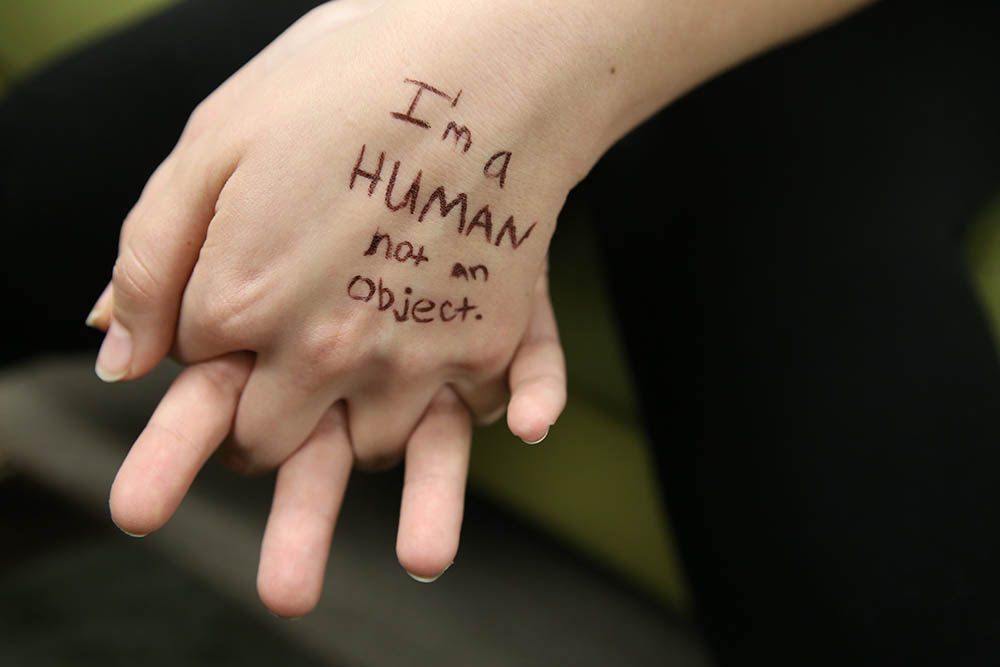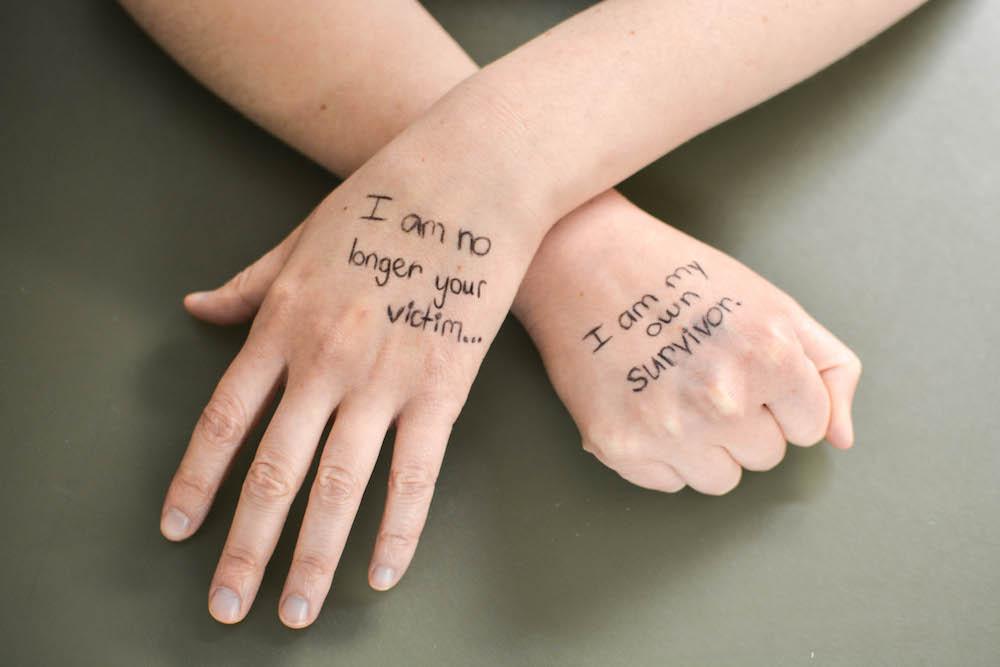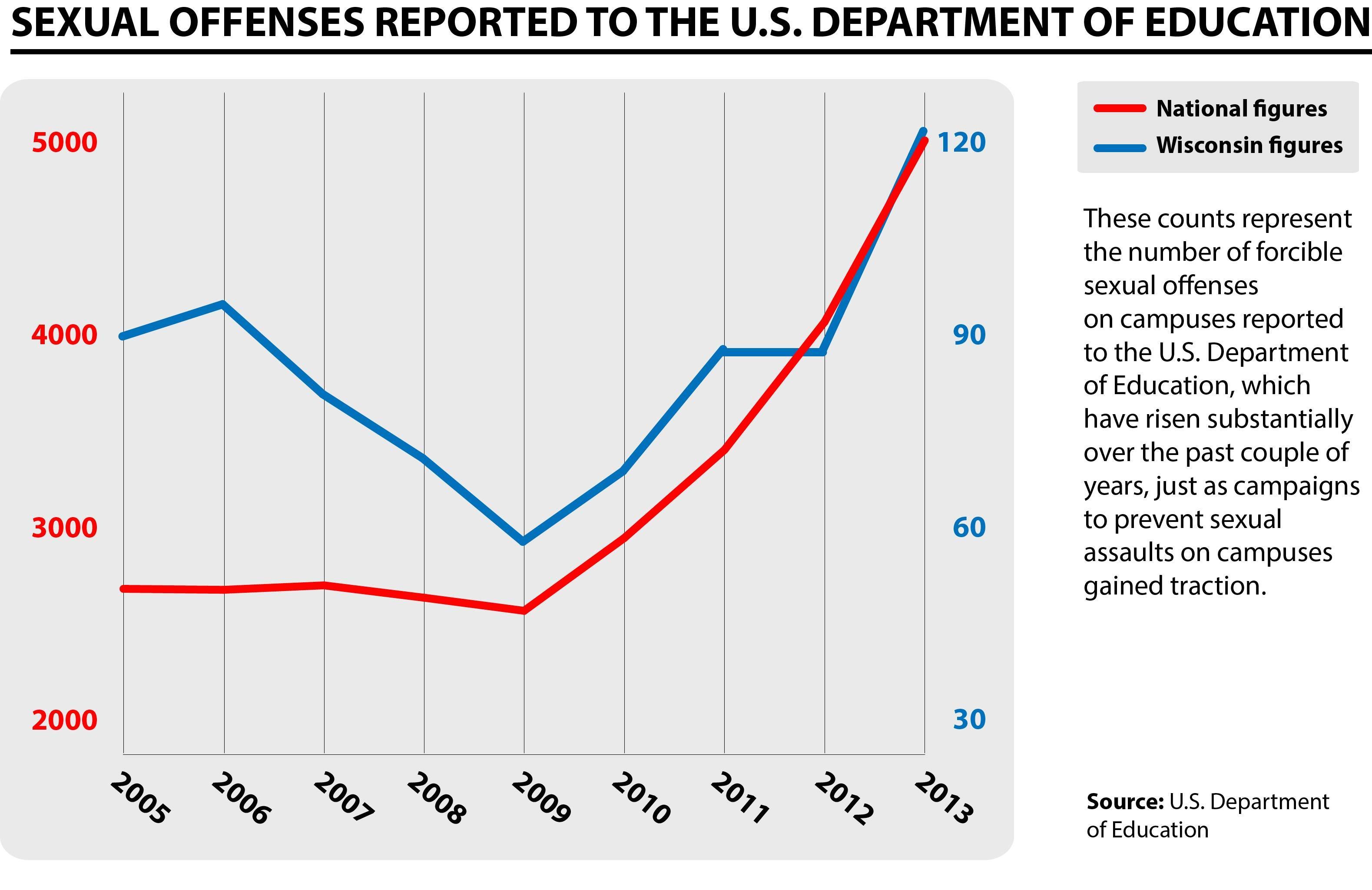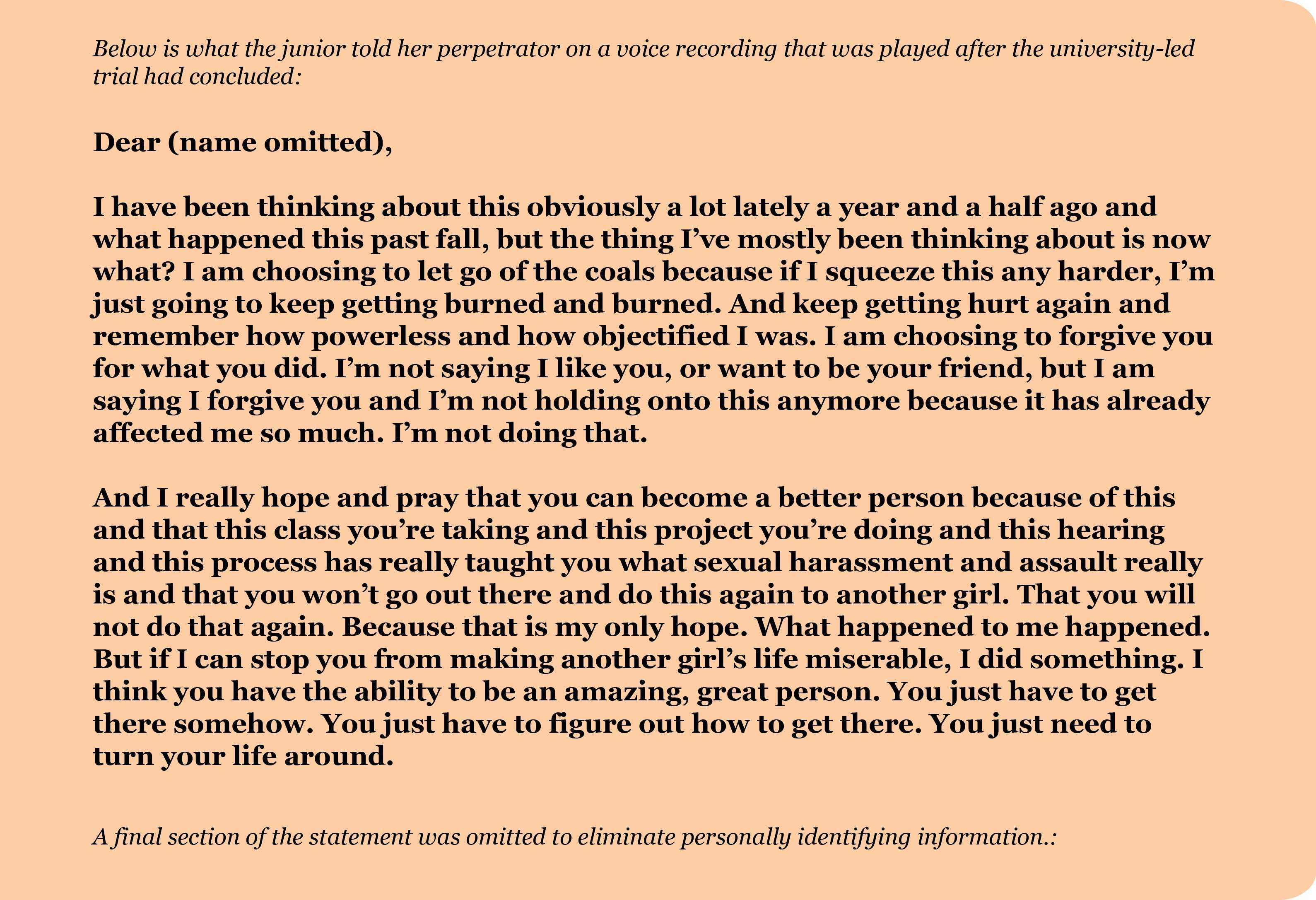‘Not an object’
A student’s experience reporting her sexual
assault to Marquette illustrates national trends
April 28, 2015 | Written by McKenna Oxenden, Rob Gebelhoff and
Patrick Thomas; photos by Rebecca Rebholz; design by Theo Syslack
- A junior sexual assault victim was asked to offer one message she wanted to portray after her experience, which she wrote on her hand.
Last fall, a junior in the College of Arts & Sciences went to the Department of Public Safety with two of her friends to report harassing Facebook messages of a sexual nature.
It was only after DPS officers asked what the messages were referring to that she first reported being sexually assaulted as a freshman in her dorm room, about a year and a half after the incident occurred.
The junior, who has decided not to press any charges against her perpetrator, was not able to give her or her perpetrator’s name because of an agreement she made with the perpetrator through a university stay away directive.
But just as with any sexual assault reported to Marquette, her case underwent an investigation conducted by the university, a process the junior praised because Marquette took the lead.
“It wasn’t my word versus him, it was Marquette versus him,” she said.
The case is one of 83 reported by the Department of Public Safety since October 2010. It is also one example of what is said to be an increasing willingness on the part of sexual assault victims to bring their cases forward, both at Marquette and at universities across the country.
“With students becoming more aware of this important environment we’re attempting to create, students are coming forward,” said Marya Leatherwood, Marquette’s Title IX coordinator. “We’re encouraged by them feeling safe enough to come forward to talk about (past experiences). Then we can get them the type of support and services they would like.”
The junior said Marquette worked with her to make sure she felt comfortable throughout the process. When she said she didn’t want to see her perpetrator at the university-led hearing on the case, Marquette arranged for her to record any statements before hand. The DPS officers also made sure she felt safe on campus.
“DPS was such a comfort,” she said. “They really took me in as their own … and said ‘I want you to be safe, you call me.’ A DPS officer even gave me his personal number.”
- Another anonymous sexual assault victim, a senior in the College of Arts & Sciences, also shared her experience on her hands.
SERVICES OFFERED TO VICTIMS
Marquette offers a wide range of services to victims of sexual assaults, from protective services to advocacy work. Campus police and on-campus advocates assist victims at every step of the investigation, from getting victims treated to offering transportation to hearings in case they want to prosecute.
The university’s Counseling Center also offers free and confidential support for anyone. While employees at Marquette are required to report sexual assaults they hear, mental health practitioners are bound by law not to disclose anything they hear to the university.
Lynn O’Brien, coordinator of Sexual Violence Prevention and Treatment Services at Marquette, said a lot of people do not take advantage of counseling services for fear that they will be expected to recount their assault.
“The place we start with someone who has been assaulted is giving them the support they need in the aftermath of the crisis, helping them re-stabilize their life,” O’Brien said. “We don’t necessarily need to start with the narrative of the assault.”
During the 2013-’14 school year, 56 students said they wanted to address sexual assault, rape or harassment at their intake appointment at the counseling center.
Leatherwood stressed that all services, including those proceeding with prosecution, are designed to be as victim-centered as possible and that the choice to share information is in students’ hands.
“Some students may report and not tell us who the perpetrator is,” Leatherwood said. “It may very well be somebody on our campus, but if they’re not willing to tell us, there’s really not that much we can do about that, except to offer them services.”
All sexual assaults at Marquette must be reported to the Milwaukee Police Department, but it is up to the student to go further with enforcement. The Office of Student Development can assign advocates to students to help them prepare for and get through university-led trials.
Students may also request a stay away directive, an on-campus restraining order preventing any form of contact in person or through social media.
If the directive is broken, the person will be escorted and dealt with by DPS.
“Our primary mission is to help survivors regain a sense of control and options so while we provide those options and describe those options available to them,” O’Brien said. “We don’t prescribe any one option. We really leave that up to the victims.”
EFFORTS GOING FORWARD
All university employees are expected to be well-versed in civil rights under Title IX and Title VII, two laws meant to prevent discrimination on the basis of sex. The emphasis has required the university to put a lot of time into training its staff.
“It speaks to the permanent priority the university designated for this important topic,” university spokesperson Brian Dorrington said.
Still, Leatherwood said the efforts to change sexual assault culture on campus are continually changing.
Bystander intervention training is now available at Marquette, allowing people to get trained on how to appropriately assist others who are involved in an uncomfortable or unsafe situation.
“It’s our feeling that when you assist other students in how to intervene appropriately, they will intervene and be a positive force in preventing or stopping something from happening,” Leatherwood said. “We’ve gotten our Greeks involved, ROTC is heavily involved, our athletes are going to be very involved.”
O’Brien said these initiatives have contributed to the rise in sexual assault reporting. They complement a larger national push to open conversation about sexual assaults on campuses across the country.
The White House unveiled the “It’s On Us” awareness campaign last fall, following up on the president’s special task force formed earlier in 2014 to make campuses safer for students.
Nationally, the number of sexual offenses reported to the U.S. Department of Education has risen substantially. In terms of on-campus sexual offenses, 5,050 were reported compared to 2,722 eight years prior. In Wisconsin, the same figure rose from 91 to 123 over the same time period.
“There have been counseling center staff involved to make some of those changes on campus, but those changes are about the process, the way we handle sexual assault,” she said. “The way we publicize like the teal ribbon campaign. Those are initiatives that are bigger than the counseling center.”
‘HOT COALS IN YOUR HAND’
The anonymous junior in the College of Arts & Sciences urged other victims of sexual assault to “let it go, but not too soon,” stressing that taking advantage of university resources is necessary.
“Don’t hold onto it for the rest of your life because it’s only going to hold you back,” she said. “So hold onto to it for a while, until it needs to be held onto, and then let it go. Forgiving is an option, but it is really hard to forget.”
For her, one of the most important steps for her healing was writing an impact statement, which allowed her to read a personal letter directly to her perpetrator.
The purpose of the statement was to give her the chance to have her power back.
“You get the last thing to say because you are the victim- but you are no longer the victim,” she said. “You get to say what you want to say and I think the fact that Marquette does that is amazing, because that (statement) made me feel so good about myself.”
Last October, the junior also attended an event on campus featuring Holocaust survivor Eva Kor, where she said she was inspired by the speaker’s discussion of forgiveness.
“She said when something bad happens to you, it’s like hot coals in your hand,” she said. “You can either squeeze it tighter and it’ll burn you more or you can let them go and they wont hurt you anymore at all.”
This is the second article in a three-part series looking into the reporting of sexual assaults at Marquette. Click here to see the rest of the series.





